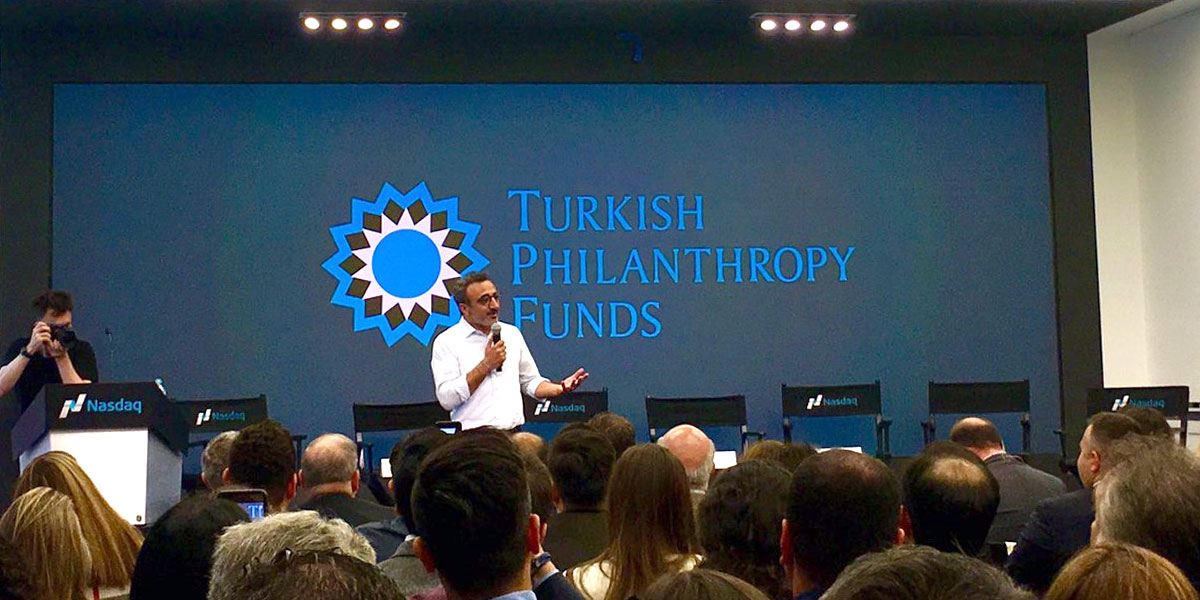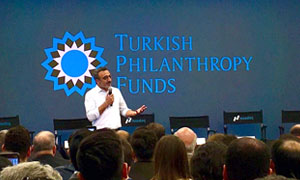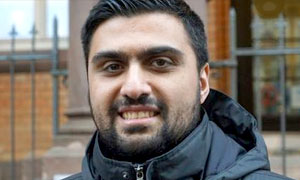October 2018

30 November 2018

23 November 2018

16 November 2018
9 November 2018

9-17 November 2018
2 November 2018

2 November 2018

1 November 2018

1 November 2018

More News

30 November 2018
Since 2007, Turkish Philanthropy Funds (TPF) has become the leading U.S. community foundation for high-impact social investments dedicated to Turkish and Turkish-American communities.

23 November 2018
A Turkish court decided for the continuation of Turkish-German journalist Adil Demirci detention in a terrorism trial. His family and friends organized a solidarity rally in Cologne.

16 November 2018
The Turkish Coalition of America (TCA) is accepting applications for the 12th Annual Washington Summer Internship Program, open to undergraduate/graduate students of Turkish-American heritage.

9 November 2018
Türkische Gemeinde in Deutschland, a.k.a. TGD (Turkish Community in Germany) is a non-profit that promotes the interests of Turks in Germany in public and in politics since 1995.

9-17 November 2018
Inaugurated in 2012 by the TACAWA Film Committee, Seattle Turkish Film Festival has become one of the most admired and venerated events of the Turkish American Cultural Association of Washington. The festival is a non-profit, volunteer-driven event, committed to bringing the best of Turkish films to Seattle.

2 November 2018
A group of German mothers are passing on their experiences of life in Berlin to help migrant women integrate. The Stadtteilmutter, or "Neighbourhood Mothers", visit families in their homes to relay basic, but much needed tips.
STORYLINE:
On a cold Autumn day in Berlin, a group of women from migrant backgrounds gather in an office building to make posters.
The posters are in a multitude of languages ranging from Arabic to Turkish, Romanian and Polish.
They're advertisements, urging others in the migrant-heavy enclave of Neukolln to apply to become a Stadtteilmutter, or "Neighbourhood Mother".
The programme was created in Berlin 15 years ago, and is meant as a means for integration.
After taking a six-month course in parenting, education and health, the goal of the Stadtteilmutter is to then infiltrate Germany's often isolated migrant communities.
Nurten Nalbantova moved to Germany from Bulgaria in the early 2000s and has been working for the Stadtteilmutter programme for the past year and a half.
She speaks Bulgarian, Turkish and German and says it takes time to build trust with the women she meets at kindergartens and schools.
"With time we get to know the women and then we do family visits, sometimes at my home or their home, or we can meet outside," Nalbantova says.
"Just drinking coffee and talking about what we have learned regarding themes such as education and upbringing and so on."
Programme coordinator Leyla Celic says that when she became a social worker almost 20 years ago, she thought the issue of integration in Germany was one that would eventually solve itself. She soon found that wasn't the case.
"Every day new people come with new attitudes, new values; who don't speak the language, don't understand the system, and they need to be prepared for this society, sought out and then accompanied," Celic says.
She maintains that many migrants and refugees still lack orientation. A Stadtteilmutter can accompany them on visits to the often daunting German government agencies, or simply relay basic, but much needed tips: like how to start German courses, how to enroll children in daycare centres or schools, how to find medical specialists, or how to understand German nutrition labels.
Topics like sexual development and other subject matters that are discussed differently in migrants' home countries compared to Germany, are also addressed.
"The mothers can on a very basic level address certain topics in their native language," Celic says. "What is a healthy diet? What is media education? What is too much? What should the children not watch on TV? Or what does addiction prevention mean?"
Because they are able to speak to families in their mother-tongue and often come from the same cultural background, a trust is established that remains out of reach for the German authorities.
"They are at the same eye-level, and also role models," Celic says. "And that's the special part. So there's no social worker from high up coming and saying, 'No, you're doing this wrong.' It's a fellow parent that can say to another, 'I understand you. I know how it is. But you can also try another way.'"
With the heavy flow of refugees Germany has seen since the Syrian War broke out, officials have stated time and again that the fostering of new refugees into productive members of society remains a top priority.
"She helps me with my children and with paperwork or if I have an issue," Kaya says.
Find out more about AP Archive: http://www.aparchive.com/HowWeWork
Twitter: https://twitter.com/AP_Archive
Facebook: https://www.facebook.com/APArchives
Google+: https://plus.google.com/b/102011028589719587178/+APArchive
Tumblr: https://aparchives.tumblr.com/
Instagram: https://www.instagram.com/APNews/
You can license this story through AP Archive: http://www.aparchive.com/metadata/youtube/adf9e3c9833f2929655ffe586feb1a83

2 November 2018
It's been 50 years since the first group of Turkish migrants landed in Australia, following a 1967 agreement signed between the two countries. There are more than 60.000 Turks living in Australia.

1 November 2018
As Germany grapples with divisions over migration, Bavaria takes action to stem the flow through the country's southern border.

1 November 2018
Muslim Behavior in Germany

More News
October 2018
Connect, Share, Inspire!
We bring you a list of published content on the lives of Turkish Expats around the world.
Send us your ideas, videos and opinions on what else we should cover on our pages. We look forward to publishing your experience with the International Turkish Community.
Turkuaz is the premier source of community news, celebrity interviews, fashion and lifestyle of International Turks around the world.
The mission of Turkuaz is to provide an ongoing forum in which Turkish Expats can connect, share and inspire one another.
Since its first issue in 2002, Turkuaz has evolved from a community-oriented quarterly in San Francisco, to a cultural publication in the US, and now a digital video-magazine that caters to the collective experience of Turks living abroad.

